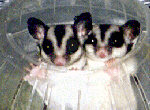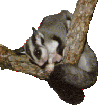|
 |
![]()
|
Sugar Gliders have become popular pets in the United States, and anyone who has ever seen one can easily tell you why. Besides being intelligent, playful and inquisitive, they are just darn cute. They also don't smell bad (if their diet is correct), don't have fleas, don't need shots, are relatively inexpensive to keep, and having one in your pocket is a sure-fire way to meet people and make new friends! Like any pet, they come with their own unique set of needs and requirements, and although there's a lot more information available now than there was a few years ago, there are still a lot of glider owners out there who really don't know how to best care for their animals. Although sugar gliders (Petaurus breviceps) are native to Australia, they have not been exported from there for many years. The ones we have in the U.S. are descendents of gliders that were imported from other places, mostly Indonesia. Like many animals from that part of the world, they are marsupials, similar in size to our American flying squirrel (but much cuter). Their name comes from their affinity for sweet things like the sweet sap that leaks from wounds in trees. At the moment they are considered an "exotic" in the U.S., and a federal license is required to sell them. Unfortunately, it is illegal to even own them in some states, notably California. Before purchasing a glider, it would be a good idea to check with the USDA's Animal Care Sector Office for your state and make sure of the laws in your area. The diet of wild sugar gliders consists mainly of sap, nectar, bugs, and small animals such as baby birds. They are nocturnal, so as pets they're most fun late in the evening and early in the morning, and they are capable of making an interesting variety of sounds. They are very clean little animals, and although they do have their own unique scents, they don't smell bad if their diet is correct. There are also some health problems that glider owners should be aware of. Following are more specific details on some of the topics touched on above, as well as the more common things that people have written and asked me about:
Glider Resources
All text and images on these pages (unless otherwise noted) |

